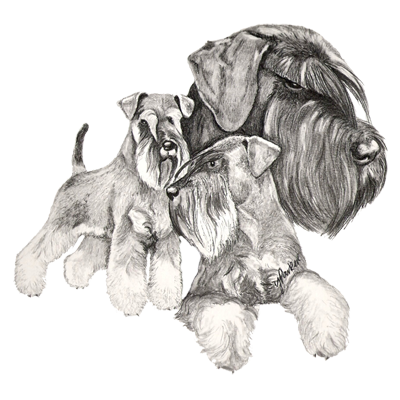Demyelinating Polyneuropathy
Demyelinating Polyneuropathy in the Miniature Schnauzer
Demyelinating polyneuropathy is an autosomal recessive disease affecting Miniature Schnauzers, first characterised in 2008 (http://www.ncbi.nlm.nih.gov/pubmed/18809183). Dogs affected with demyelinating polyneuropathy show clinical signs which can include continuous episodes of regurgitation, inspiratory stridor (noisy breathing on inhalation) and subtle exercise intolerance, caused by a reduction in motor and sensory nerve conduction velocities due to nerve cell demyelination. The onset of disease is from 3 months of age and clinical signs are progressive.
In 2014, with collaborative efforts between the University of Bristol, University College London, and the Animal Health Trust, the mutation causing demyelinating polyneuropathy was identified and a test is now available at both the University of Bristol and the Animal Health Trust.
To evaluate the value of the test to breeders the Animal Health Trust tested 220 Miniature Schnauzer DNA samples collected for unrelated projects, identifying 11 carriers. With this number of carriers in the population you would expect approximately 1 in 1600 puppies born to be affected with demyelinating polyneuropathy. Breeding with two carriers gives a one in four chance of an puppy affected being born, so in a litter size of eight for example you would expect two puppies to be affected with this condition.
Although this unpleasant condition is rare we feel there is significant value in offering the DNA test, which will be priced at £40 + VAT. Sample kits can be ordered through our Webshop (http://www.ahtdnatesting.co.uk) from 1st November.
Definitions of the possible results are as follows:
CLEAR:
The dog has 2 copies of the normal gene and will neither develop demyelinating polyneuropathy, nor pass a copy of the demyelinating polyneuropathy gene to any of its offspring.
CARRIER:
The dog has one copy of the normal gene and one copy of the mutant gene that causes demyelinating polyneuropathy. It will not develop demyelinating polyneuropathy but will pass on the demyelinating polyneuropathy gene to 50% (on average) of its offspring.
AFFECTED:
The dog has two copies of the demyelinating polyneuropathy mutation and is affected with demyelinating polyneuropathy.

